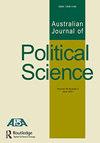作为审议制度的澳大利亚土著环境政策
IF 1.2
3区 社会学
Q3 POLITICAL SCIENCE
引用次数: 3
摘要
摘要尽管人们对土著环境价值观的理解有所提高,但政府仍然未能将这些价值观尊重地纳入环境政策。深思熟虑的民主理论有助于更好地理解这个问题。首先,承认土著民主是一种独特的审议制度,并提请人们注意这种对更大民主制度的“无形”民主贡献。其次,土著环境政策对公开解决土著环境价值观的抵制,可以被理解为土著人民和定居者国家之间传播的薄弱环节。第三,与国家相关的土著协商论坛可能有助于克服环境政策中的一些障碍。深思熟虑的民主使人们注意到土著人民与国家之间的环境关系,不仅是土著政策的制定,也是民主的制定。本文章由计算机程序翻译,如有差异,请以英文原文为准。
Australian Indigenous environment policy as a deliberative system
ABSTRACT Despite increased understanding of Indigenous environmental values, governments still fail to respectfully incorporate these values into environmental policy. Deliberative democratic theory can help to better understand this problem. First, by recognising Indigenous democracy as a distinct deliberative system and drawing attention to this ‘invisible’ democratic contribution to the larger democratic system. Second, the resistance of Indigenous environment policy to openly address Indigenous environmental values, can be understood as weakness in transmission between Indigenous peoples and the settler state. Third, Indigenous deliberative forums linked to the state may help overcome some of these barriers in environment policy. Deliberative democracy draws attention to environmental relations between Indigenous peoples and the state not simply as Indigenous policy making but as democracy making.
求助全文
通过发布文献求助,成功后即可免费获取论文全文。
去求助
来源期刊

Australian Journal of Political Science
POLITICAL SCIENCE-
CiteScore
2.10
自引率
8.30%
发文量
25
期刊介绍:
The Australian Journal of Political Science is the official journal of the Australian Political Studies Association. The editorial team of the Journal includes a range of Australian and overseas specialists covering the major subdisciplines of political science. We publish articles of high quality at the cutting edge of the discipline, characterised by conceptual clarity, methodological rigour, substantive interest, theoretical coherence, broad appeal, originality and insight.
 求助内容:
求助内容: 应助结果提醒方式:
应助结果提醒方式:


